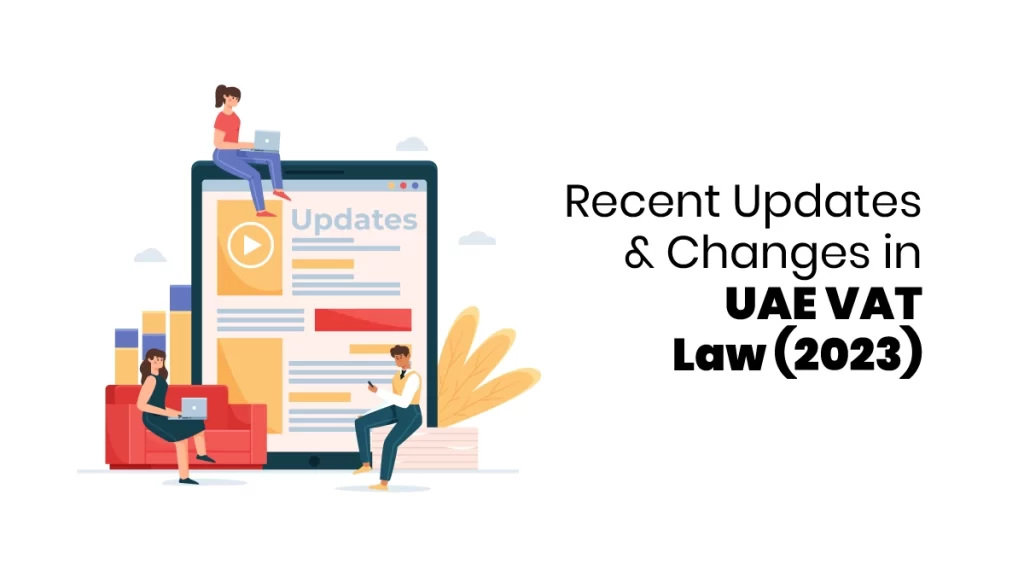In 2018, the United Arab Emirates revised its VAT regulations in response to the global trend of widespread VAT implementation. However, these alterations directly impact purchasing VAT goods and services, necessitating businesses to remain well-informed about the updated VAT rules. The government has enacted the newly introduced VAT regulations in the UAE to enhance tax compliance and prevent potential penalties. These modifications have been incorporated into the UAE VAT Decree-Law and directly affect business operations. It is imperative for businesses in the UAE to consistently adhere to any new VAT regulations that may be introduced periodically.
Value Added Tax (VAT) in the UAE
Value Added Tax, commonly called VAT, is an indirect tax applied to the total value of goods and services consumed. This Tax is widely utilized in numerous countries and is imposed on most transactions involving purchasing and selling goods and services. Consequently, it is one of the most commonly employed forms of consumption taxes. Before delving into the intricacies of VAT regulations in the UAE, it is essential to grasp the fundamental concept behind them. A tax serves as a government mechanism to generate revenue. Funding for public services, such as infrastructure development, schools, hospitals, and other essential facilities, is derived from this revenue.
Recent Updates and Changes in UAE VAT Law
Businesses operating in the UAE must stay informed about the newly introduced VAT regulations. Amendments to the UAE VAT Decree-Law have recently been announced and will be effective starting January 2023. The fundamental changes to the VAT Law are summarized as follows:
Extended Timeframe for Tax Audits
Under the new regulations, a tax audit for a monthly or quarterly tax period typically cannot be initiated after five years from the conclusion of that specific tax period. However, suppose a taxpayer has received notification of a tax audit within these five years. In that case, the actual audit can be conducted and concluded during the subsequent four years following the announcement.
Tax Audits Post Voluntary Disclosures
Suppose a Voluntary Disclosure for a monthly or quarterly tax period is submitted in the 5th year from the end of that tax period. In that case, the Federal Tax Authority (FTA) will be granted an additional year to conduct a tax audit. This extra time ensures that the FTA has sufficient duration to process the voluntary disclosure and conduct necessary supplementary audits based on the disclosed information.
Tax Evasion Investigations
In tax evasion cases, a tax audit can be carried out within 15 years from the conclusion of the tax period in which the tax evasion took place. Tax evasion means using illegal by an individual, whether registered for VAT or not, to reduce the tax amount, fail to pay the Tax, or improperly claim an ineligible tax refund.
Consequences of Failing to Obtain VAT Registration
There is a common misconception that evading VAT registration will go unnoticed by tax authorities. However, an individual or business needs to obtain VAT registration. In that case, the Federal Tax Authority (FTA) may initiate a tax audit within 15 years from the date that person should have been registered. In light of this, businesses must reassess their obligations regarding VAT registration, especially in cases involving registration errors related to companies engaged in zero-rated supplies.
Favourable Provisions for 100% Exporters
In the same context of tax regulations, it’s worth noting that businesses whose entire supply is categorized as zero-rated are not obligated to bear the burden of periodic VAT compliances. These businesses have the option to request an exception from VAT registration. Previously, companies unaware of this advantageous provision and already VAT registered were compelled to continue their routine VAT compliances.
Enhanced Compliance for Input Credit on Imported Services
Many businesses enter into agreements with overseas service providers without insisting on issuing invoices. Recent changes in VAT laws have established that, for the import of services, input credit can only be reclaimed if the taxpayer receives and retains invoices in strict accordance with VAT laws. This highlights the importance of adhering to invoicing requirements when dealing with imported services.
VAT Implications in the Construction Sector and Retention Payments
VAT dynamics and retention payments have witnessed significant changes in the construction industry. When the duration between the progressive delivery milestones of goods or services and the subsequent retention payment claims extends beyond 12 months, it can potentially result in VAT liability. An essential addition to VAT laws is introducing a specific date of supply for VAT purposes: the expiration date, which occurs one year from the provision date of the goods or services. This modification has profound implications for VAT calculations within the construction sector.
Deemed Supplies to Related Parties and VAT Considerations
Previously, situations involving deemed supplies, such as providing goods to related parties at no cost (FOC), could trigger VAT liabilities following existing regulations. However, recent amendments to VAT laws have clarified that a company may be exempt from VAT liabilities when offering goods or services FOC to related parties. This exemption is contingent upon the recipient company’s eligibility to recover 100% input credit on its procurement. This shift in legislation eases VAT obligations in such scenarios, provided specific conditions are met.
The recent amendments to the UAE VAT Decree-Law are part of a worldwide trend, highlighting the adaptability of tax laws to the evolving economy and the responsiveness of tax authorities to taxpayers’ needs. As VAT laws undergo modifications, corresponding adjustments will likely follow in the executive regulations. Business owners are encouraged to proactively assess the ramifications of these recent changes before their scheduled implementation on January 1, 2023. This proactive approach is essential for businesses to stay compliant and well-prepared in this evolving tax landscape.
Embarking a UAE VAT course can significantly transform your career prospects in the GCC countries. It can enhance your practical understanding of VAT, enabling you to navigate the daunting VAT processes for businesses. Finprov offers tailored courses designed to cater to everyone, from fresh graduates to seasoned professionals. Our courses equip you with the necessary skills to secure a rewarding position quickly. We also provide invaluable placement support to our students.
Our UAE VAT course encompasses crucial subjects, encompassing the fundamental principles of VAT and its operational intricacies, a comprehensive overview of the VAT registration procedure, the impact of VAT on import and export enterprises, in-depth exploration of invoicing and documentation requisites, a thorough understanding of VAT compliance and filing duties, mastery of accounting entries, sound recordkeeping practices, and insights into potential penalties. Proficiency in these areas opens doors to various career avenues, including VAT Executive, VAT Consultant, Finance Manager, Senior Accountant, Tax Executive, VAT Expert, Billing Clerk, Sales Accounting Manager, or various administrative positions.






